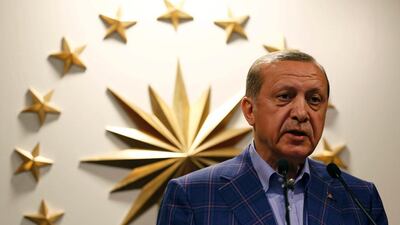For a man who has never lost an election, even Recep Tayyip Erdogan must be concerned at how close Sunday’s vote was. By a slim margin – barely 3 per cent – Mr Erdogan pulled off a victory in a referendum that will reshape how the modern Turkish state functions.
That means that, to all intents and purposes, the country is split. Mr Erdogan is certainly popular – there is no political figure as dominant in the country – but his personal popularity is not inexhaustible. That is an important lesson in humility for a leader who often acts as if he alone has the answers, but it is only a lesson if he chooses to heed it.
For the sake of the Middle East, he must. Turkey is an important country in the region, one of the most important. And, without a doubt, he faces a difficult environment, with the Syrian civil war burning next door and severe economic uncertainty in Greece, as well as domestic terrorism from separatist Kurdish groups. As both prime minister and president, Mr Erdogan has taken bold decisions, which have sometimes ended spectacularly badly.
On two pivotal decisions, his backing for Mohammed Morsi in Egypt and his decision to publicly declare the Assad regime must end, his decisions were made with inadequate consideration. Mr Erdogan has made no secret of his belief that the removal of Mr Morsi in Egypt was a mistake. But he did not fully grasp the true nature of the Muslim Brotherhood and how far the group was willing to go to reshape Egypt for its own ends.
The same lack of understanding formed his early views of the Syrian uprising. He was right to recognise that Bashar Al Assad could not put down protests against his rule so forcefully and remain in power. But by throwing the weight of his government so much behind the rebels, he allowed elements to operate across Turkish soil that would prove damaging for Turkey itself.
This referendum puts Mr Erdogan in a strong position. But he must not confuse it with total victory. Within Turkey, he still needs to appeal to voters in the major cities, which by and large voted no. Beyond Turkey’s borders, he must also understand that his country is not the only one that matters in the region. Egypt, Saudi Arabia, even the UAE, have legitimate views and interests, and it would be better if there was cooperation rather than competition. Even a figure as dominant as Mr Erdogan does not have all the answers for an entire region.

